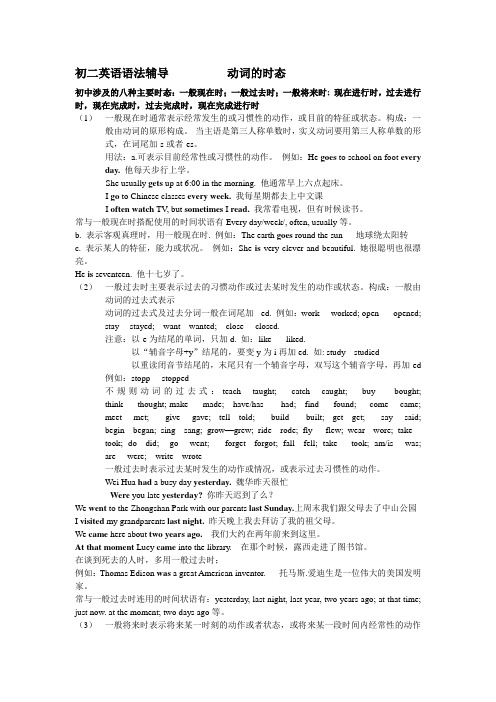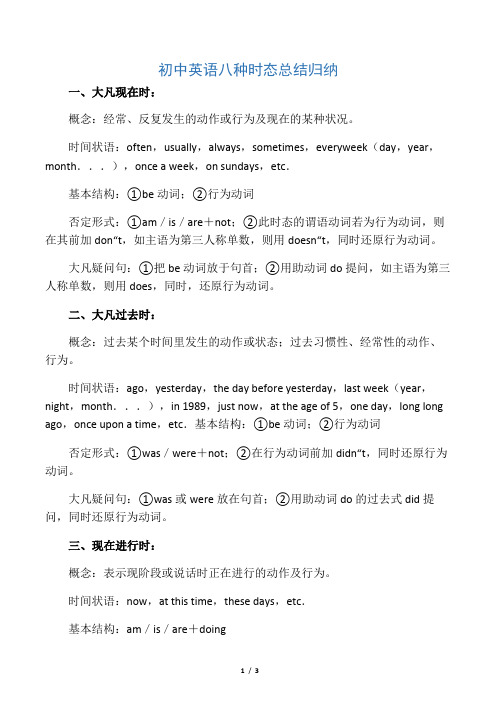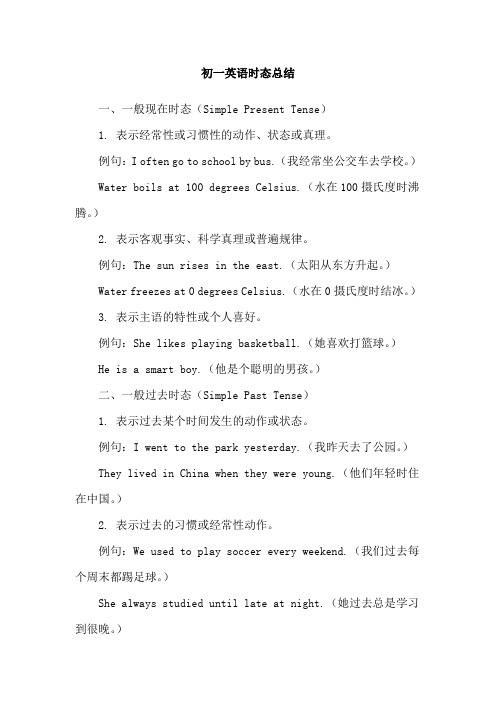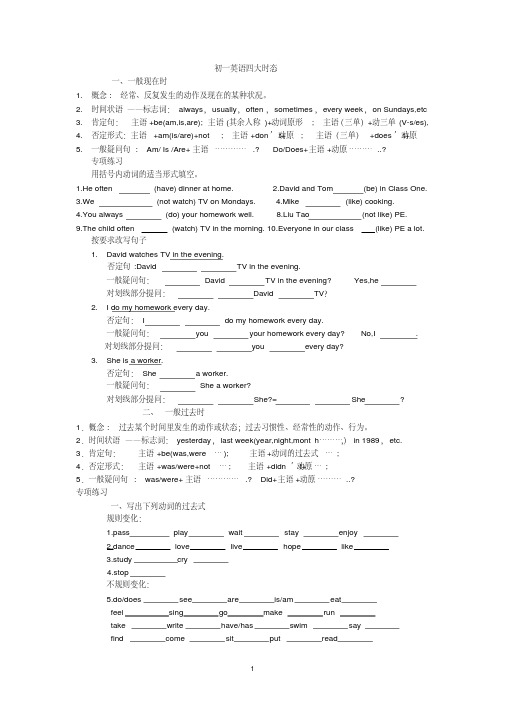初一初二英语时态
初二英语语法辅导__________动词的时态

初二英语语法辅导动词的时态初中涉及的八种主要时态:一般现在时;一般过去时;一般将来时; 现在进行时,过去进行时,现在完成时,过去完成时,现在完成进行时(1)一般现在时通常表示经常发生的或习惯性的动作,或目前的特征或状态。
构成:一般由动词的原形构成。
当主语是第三人称单数时,实义动词要用第三人称单数的形式,在词尾加-s或者-es。
用法:a.可表示目前经常性或习惯性的动作。
例如:He goes to school on foot every day.他每天步行上学。
She usually gets up at 6:00 in the morning. 他通常早上六点起床。
I go to Chinese classes every week.我每星期都去上中文课I often watch TV, but sometimes I read.我常看电视,但有时候读书。
常与一般现在时搭配使用的时间状语有Every day/week/, often, usually等。
b. 表示客观真理时,用一般现在时. 例如:The earth goes round the sun 地球绕太阳转c. 表示某人的特征,能力或状况。
例如:She is very clever and beautiful. 她很聪明也很漂亮。
He is seventeen. 他十七岁了。
(2)一般过去时主要表示过去的习惯动作或过去某时发生的动作或状态。
构成:一般由动词的过去式表示动词的过去式及过去分词一般在词尾加-ed. 例如:work----worked; open-----opened;stay--- stayed; want---wanted; close----closed.注意:以-e为结尾的单词,只加d. 如:like-----liked.以“辅音字母+y”结尾的,要变y为i再加ed. 如: study---studied以重读闭音节结尾的,末尾只有一个辅音字母,双写这个辅音字母,再加-ed 例如:stopp----stopped不规则动词的过去式:teach----taught; catch----caught; buy---- bought;think-----thought; make-----made; have/has------had; find-----found; come----came;meet----met; give----gave; tell---told; build--- built; get---get; say----said;begin---began; sing---sang; grow—grew; ride---rode; fly--- flew; wear---wore; take--- took; do---did; go----went; forget---forgot; fall---fell; take--- took; am/is----was;are----were; write---wrote一般过去时表示过去某时发生的动作或情况,或表示过去习惯性的动作。
(完整版)初中英语八种时态总结归纳

初中英语八种时态总结归纳一、大凡现在时:概念:经常、反复发生的动作或行为及现在的某种状况。
时间状语:often,usually,always,sometimes,everyweek(day,year,month...),once a week,on sundays,etc.基本结构:①be动词;②行为动词否定形式:①am/is/are+not;②此时态的谓语动词若为行为动词,则在其前加don“t,如主语为第三人称单数,则用doesn“t,同时还原行为动词。
大凡疑问句:①把be动词放于句首;②用助动词do提问,如主语为第三人称单数,则用does,同时,还原行为动词。
二、大凡过去时:概念:过去某个时间里发生的动作或状态;过去习惯性、经常性的动作、行为。
时间状语:ago,yesterday,the day before yesterday,last week(year,night,month...),in 1989,just now,at the age of 5,one day,long long ago,once upon a time,etc.基本结构:①be动词;②行为动词否定形式:①was/were+not;②在行为动词前加didn“t,同时还原行为动词。
大凡疑问句:①was或were放在句首;②用助动词do的过去式did提问,同时还原行为动词。
三、现在进行时:概念:表示现阶段或说话时正在进行的动作及行为。
时间状语:now,at this time,these days,etc.基本结构:am/is/are+doing否定形式:am/is/are+not+doing大凡疑问句:把be动词放在句首四、过去进行时:概念:表示过去某段时间或某一时刻正在发生或进行的行为或动作。
时间状语:at this time yesterday,at that time或以when引导的谓语动词是大凡过去时的时间状语等。
初一英语时态总结

初一英语时态总结一、一般现在时态(Simple Present Tense)1. 表示经常性或习惯性的动作、状态或真理。
例句:I often go to school by bus.(我经常坐公交车去学校。
) Water boils at 100 degrees Celsius.(水在100摄氏度时沸腾。
)2. 表示客观事实、科学真理或普遍规律。
例句:The sun rises in the east.(太阳从东方升起。
)Water freezes at 0 degrees Celsius.(水在0摄氏度时结冰。
) 3. 表示主语的特性或个人喜好。
例句:She likes playing basketball.(她喜欢打篮球。
)He is a smart boy.(他是个聪明的男孩。
)二、一般过去时态(Simple Past Tense)1. 表示过去某个时间发生的动作或状态。
例句:I went to the park yesterday.(我昨天去了公园。
) They lived in China when they were young.(他们年轻时住在中国。
)2. 表示过去的习惯或经常性动作。
例句:We used to play soccer every weekend.(我们过去每个周末都踢足球。
)She always studied until late at night.(她过去总是学习到很晚。
)3. 表示过去的真理或规律。
例句:Dinosaurs existed millions of years ago.(恐龙存在于几百万年前。
)The Earth was flat according to ancient beliefs.(根据古代的信仰,地球是平的。
)三、一般将来时态(Simple Future Tense)1. 表示将来某个时间或在某个时间之后发生的动作或状态。
例句:I will visit my grandparents next week.(下周我会去看望我的祖父母。
初一初二英语时态

• 1.be going to+动词原形 : 表示打算、准备做的事或即将发生或肯定要发生的 事。 2.will [wil] +动词原形 : 表示将要发生的动作或情况,没有太多的计划性, 还用 来表示意愿。
• Where are you going to spend Spring Festival.? • My sister is going to learn English next year. • Will you stay at home with us tomorrow ?
• 肯定句:主语+was/were+doing+其它 • 否定句:主语+was/were+not+doing+其它 • 一般疑问句及答语: Was/Were+ 主语+do ing+ 其它 ;答语:Yes,I 主语
+was/were./No,I主语+wasn't/weren't. • 特殊疑问句:特殊疑问词+was/were+主语+doing+其它 • He was working when he was alive.
谢谢您的观看!
第13页/共13页
• At that time she was very good at English. • We often played together when we were children.
第2页/共13页
• 一般将来时常用的两种结构 1.be going to+动词原形 : 表示打算、准备做的事或即将发生或肯定要发生的 事。 2.will [wil] +动词原形 : 表示将要发生的动作或情况,没有太多的计划性, 还用 来表示意愿。
初一英语四大时态

Today is Saturday. Tomorrow will be Sunday. 今天是星期六。明天(将)是星期日。
He will be thirty years old this time next year. 明年这个时候他就 (将 )三十岁。
3
3、问对方是否愿意做某事或表示客气地邀请或命令。
at school just now.
2.He
at the camp last week.
3.We
students two years ago. 4.They
on the farm a moment ago.
5.Yang Ling
eleven years old last year.
6.There
lots of grapes here
live
hope
like
3.study
cry
4.stop
不规则变化:
5.do/does
ห้องสมุดไป่ตู้
see
are
is/am
eat
feel
sing
go
make
run
take
write
have/has
swim
say
find
come
sit
put
read
1
二、用动词的适当形式填空( was/were/is ) .
1.I
her homework yesterday evening.
一般疑问句:
Ann
her homework yesterday
evening?No, 对划线部分提问:
. Ann
yesterday evening?
初一英语四种基本时态

初一英语四种基本时态复习一、一般现在时一般现在时的用法1)经常性或习惯性的动作,常与表示频腮度的时间状语连用。
时间状语:every…,sometimes,at…,onSunday。
例如:Ileavehomeforschoolat7everymorning.每天早上我七点离开家。
2)客观真理,客观存在,科学事实。
例如:Theearthmovesaroundthesun.地球绕太阳转动。
ShanghailiesintheeastofChina.上海位于中国东部。
3)表示格言或警句。
例如:Pridegoesbeforeafall.骄者必败。
注意:此用法如果出现在宾语从句中,即使主句是过去时,从句谓语也要用一般现在时。
例:Columbusprovedthattheearthisround.哥伦布证实了地球是圆的。
4)现在时刻的状态、能力、性格、个性。
例如:Idon'twantsomuch.我不要那么多。
AnnwritesgoodEnglishbutdoesnotspeakwell.安英语写得不错,讲的可不行。
课堂小测1.Weoften______(play)intheplaygound.2.He_____(get)upatsixo’clock.3._____you______(brush)yourteetheverymorning.4.What(do)______heusually(do)______afterschool?5.Danny_____(study)English,Chinese,Maths,ScienceandArtanschool.6.Mikesometimes________(go)totheparkwithhissister.7.Ateightatnight,she__________(watch)TVwithhisparents.8.________Mike________(read)Englisheveryday?9.Howmanylessons_________yourclassmate________(have)onMonday?10.Whattime_________hismother_________(do)thehousework?改句子1.Doyouoftenplayfootballafterschool?(肯定回答)2.GaoShan’ssisterlikesplayingtabletennis(改为否定句)3.ShelivesinasmalltownnearNewYork.(改为一般疑问句)4.Wehavefourlessons.(否定句)5.Nancydoesn’trunfast(肯定句)6.Mikehastwolettersforhim.一般疑问句:否定句:7.IusuallyplayfootballonFridayafternoon.否定句:一般疑问句:划线提问8.Tomdoeshishomeworkathome.否定句:一般疑问句:划线提问二、一般过去时一般过去时的基本用法:1. 通常表示过去发生的而现在已经结束的事件、动作或情况。
初一初二英语时态归纳总结有哪些

初一初二英语时态归纳总结有哪些初一初二的英语时态知识点很多,怎么样才能更好的对它们进行复习呢?请看下文,以下是分享给大家的初一初二英语时态归纳总结,希望可以帮到你!初一初二英语时态归纳总结1. The Simple Present Tense 一般现在时一般现在时最容易出现错误的地方是在第三人称单数形式上。
everyone,everybody,no one,nobody,someone,somebody,nothing,everything,anything,以及none,each,every引导的名词或代词作主语时,谓语动词要用单数形式。
例如:Everyone is here. 大家都在这里。
No one knows his name. 没有人知道他的名字。
2. The Present Continuous Tense 现在进行时现在进行时最容易出现错误的地方在动词的现在分词形式上,我们在复习的时候要特别注意不规则动词的变化形式。
例如:swimming,beginning,putting,taking,buying。
3. The Simple Future Tense 一般将来时1) 一般将来时表示将来某个时间要发生的动作或存在的状态,也表示将来经常或反复发生的动作,常与表示将来的时间状语连用,如:tomorrow,next week,next year等。
其构成为助动词will +动词原形。
2) be going to 用于一般将来时态中,表示打算,准备,将要。
动词be 要随着主语的人称变化而变化,后面要用动词的原形。
例如:He is going to walk to school.I am going to buy a new CD.They are going to wash the dishes after dinner.3) go,come,leave这三个词一般不放在be going to 的后面,这三个动词如果要表示将来时,要直接用be+ going/ coming/ leaving 的形式。
初一初二英语时态归纳总结有哪些

初一初二英语时态归纳总结有哪些初一初二的英语时态知识点很多,怎么样才能更好的对它们进行复习呢?请看下文,以下是分享给大家的初一初二英语时态归纳总结,希望可以帮到你!初一初二英语时态归纳总结1. The Simple Present Tense 一般现在时一般现在时最容易出现错误的地方是在第三人称单数形式上。
everyone,everybody,no one,nobody,someone,somebody,nothing,everything,anything,以及none,each,every引导的名词或代词作主语时,谓语动词要用单数形式。
例如:Everyone is here. 大家都在这里。
No one knows his name. 没有人知道他的名字。
2. The Present Continuous Tense 现在进行时现在进行时最容易出现错误的地方在动词的现在分词形式上,我们在复习的时候要特别注意不规则动词的变化形式。
例如:swimming,beginning,putting,taking,buying。
3. The Simple Future Tense 一般将来时1) 一般将来时表示将来某个时间要发生的动作或存在的状态,也表示将来经常或反复发生的动作,常与表示将来的时间状语连用,如:tomorrow,next week,next year等。
其构成为助动词will +动词原形。
2) be going to 用于一般将来时态中,表示打算,准备,将要。
动词be 要随着主语的人称变化而变化,后面要用动词的原形。
例如:He is going to walk to school.I am going to buy a new CD.They are going to wash the dishes after dinner.3) go,come,leave这三个词一般不放在be going to 的后面,这三个动词如果要表示将来时,要直接用be+ going/ coming/ leaving 的形式。
- 1、下载文档前请自行甄别文档内容的完整性,平台不提供额外的编辑、内容补充、找答案等附加服务。
- 2、"仅部分预览"的文档,不可在线预览部分如存在完整性等问题,可反馈申请退款(可完整预览的文档不适用该条件!)。
- 3、如文档侵犯您的权益,请联系客服反馈,我们会尽快为您处理(人工客服工作时间:9:00-18:30)。
• so far往往表示到目前为止动作或状态已经 发生 • for+一段时间或since+时间点用现在完成时 • I have just heard the news. • I have live here since my childhood. • I have never visited the USA. • I have learned English hard for 10 days.
3.一般将来时
• 表示将来某个时间要发生的动作或存在的 状态,也表示将来经常或重复发生的动作, 常与表示将来的时间状语连用。如: tomorrow , soon , next Monday , next year , next weekend , this afternoon , this evening, the day after tomorrow(后天) 等
• He often _________ supper at 6:00 in the evening. • A. have B. has c. is having D. is eating • She ______ to work when the telephone rang. • A. is going B. will go • C. was about to go D. is to go • The famous writer _____ one new book in the past two year • A. is writing B.was writing C.wrote D.has w ritten
• The earth moves around the sun. • She is a good girl and always help others • My friends often go to the park on Sundays.
2.一般过去时
• 一般过去时表示过去某一时候或某一段时 间所发生了的事情或存在的状态。常与过 去时间yesterday, this morning, just now, a moment ago, in May, last night / year / week, once upon a time, the other day, before …, when – clause, in the past连用。 • At that time she wWe often played together when we were children.
• Harry Potter is a very nice film .I_____ it twice . • A. will see B. have seen C. saw D.see • By the time he was 4, he ______ a lot of German words. • A. had learned B. has learned C. learned D. learns
时态
• • • • • • 一般现在时 一般过去时 一般将来时 现在进行时 现在完成时 过去进行时
• •
•
• •
1.一般现在时 1) 经常性或习惯性的动作,常与表示频率 副词的时间状语连用。 时间状语: every morning ,sometimes, at…, on Sunday, often. Usually 2) 用于表示客观真理,客观存在,科学事 实 3) 用于格言或警句中。 4) 用于表示现在时刻的状态、能力、性格、 个性。
5.现在完成时
• 现在完成时表示过去发生或已经完成的动 作对现在造成的影响或结果,也可表示过去 已经开始,一直延续到现在的动作或状态
5.现在完成时
• 现在完成时表示过去发生或已经完成的动 作对现在造成的影响或结果,也可表示过去 已经开始,一直延续到现在的动作或状态 • 基本结构:主语+have/has+过去分词(done) • 肯定句:主语+have/has+过去分词+其他 • 否定句:主语+have/has+not+过去分词+其 他 • 一般疑问句:Have/Has+主语+过去分词+ 其他
• 1.be going to+动词原形 : 表示打算、准备 做的事或即将发生或肯定要发生的事。 2.will [wil] +动词原形 : 表示将要发生的动作 或情况,没有太多的计划性, 还用来表示意 愿。 • Where are you going to spend Spring Festival.? • My sister is going to learn English next year. • Will you stay at home with us tomorrow ?
• 肯定句:主语+was/were+doing+其它 • 否定句:主语+was/were+not+doing+其它 • 一般疑问句及答语:Was/Were+主语 +doing+其它 ;答语:Yes,I主语 +was/were./No,I主语+wasn't/weren't. • 特殊疑问句:特殊疑问词+was/were+主语 +doing+其它 • He was working when he was alive.
• 一般将来时常用的两种结构 1.be going to+动词原形 : 表示打算、准备 做的事或即将发生或肯定要发生的事。 2.will [wil] +动词原形 : 表示将要发生的动作 或情况,没有太多的计划性, 还用来表示意 愿。 • Where are you going to spend Spring Festival? • My sister is going to learn English next year. • Will you stay at home with us tomorrow ?
6.过去进行时
用法:①过去某个时间正在发生的动作 例:He was cooking at six last night. 昨天 晚上六点,他正在做饭。 ②过去某段时间正在发生的动作 例:I was staying here from March to May last year. 去年从3月到5月,我一直呆在这 里。 2 与过去进行时连用的时间状语,常见的有at nine last night/ at that time= then/ at this time yesterday /或有when the teacher came in/ while he was reading的 提示
